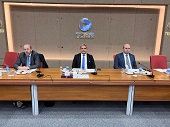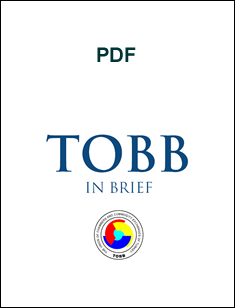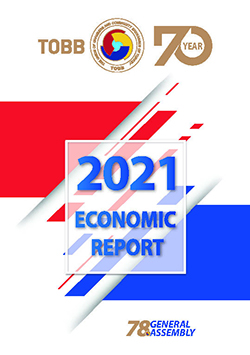Türkiye Cement and Cement Products Sector Council convened

06.11.2023 /
The expanded meeting of the Union of Chambers and Commodity Exchanges of Türkiye (TOBB) Cement and Cement Products Council was held under the chairmanship of TOBB Board Member Şaban A. Karamehmetoğlu with the participation of public, civil society and private sector representatives.
In his opening speech, TOBB Board Member Şaban A. Karamehmetoğlu stated that climate change and green transformation are high on the agenda of our country as in many countries, and as TOBB; at every opportunity and on every platform, they emphasize that this process is not only an environmental policy, but also a trade policy and economic policy.
Stating that they are looking forward to the Climate Law that the Ministry of Environment, Urbanization and Climate Change is working on, Karamehmetoğlu added that the Law will be guiding for many sectors, especially carbon-intensive sectors such as cement.
Karamehmetoğlu expressed that they are aware that both the Carbon Regulation Mechanism Process at the Border (CCRM) and the Emissions Trading System (ETS) impose a great burden on the sector, but he appreciated the determination of the Ministry for its efforts to overcome this situation together with the cooperation of the private sector and the public sector, and thanked the Ministry. Karamehmetoğlu mentioned that another important issue for the sector is the Regulation on Registration, Evaluation, Authorization and Restriction of Chemicals (KKDİK) and Registration Processes, and pointed out that this issue is of great importance for the sector.
Volkan Bozay, Vice President of the Council, stated that the transformation process has been initiated rapidly, especially in the earthquake zone, with the rapid actions taken by the Government following the tragic earthquake disaster on February 6, 2023. He emphasized that the cement, cement products and ready-mixed concrete sectors, which have strategic importance in terms of urban transformation, earthquake preparedness and development targets, are among the most important stakeholders of the construction sector.
Stating that green transformation, digital and social transformation are of vital importance for every producer, Bozay stated that the transition process of the European Union Border Carbon Regulation Mechanism started on October 1, 2023, and financial obligations will start as of January 1, 2026, and these obligations will be applied to the imports of cement, iron-steel, aluminum, fertilizer, electricity and hydrogen intermediate goods with the highest carbon intensive production and carbon leakage.
He underlined that in order to minimize the impacts of the SDCC, the priority is to increase low-carbon production and the goal is to enable the use of low-carbon cement in public tenders. Mr. Bozay stated that the cement sector is highly motivated to achieve greenhouse gas reduction, but that the legal infrastructure needs to be prepared and the sector needs access to financing. Drawing attention to the importance of the National Emission Trading System, which is expected to be realized with the Climate Law to be published, Bozay stated that the sector is continuing its preparations in this regard.
At the meeting, Volkan Bozay stated that the most important issue, apart from the procedural preparations of the EU Border Carbon Regulation Mechanism, is the implementation of the roadmap determined for low carbon production in cooperation with the public sector and urgently in line with the 2053 net zero target.
Nihat Yaman, Head of the Chemicals Management Department of the Ministry of Environment, Urbanization and Climate Change, made evaluations on the Draft KKDİK Regulation, while Eyüp Kaan Moralı, Head of the Carbon Pricing Department of the Climate Change Directorate, informed the meeting participants in detail about the process with his presentation on the Border Carbon Regulation Mechanism process (BCRM) and Emission Trading System (ETS) specific to the Cement and Cement Products Sector. At the end of the meeting, a Q&A session was held and the meeting was concluded.
Your message has been sent
Thank you |




